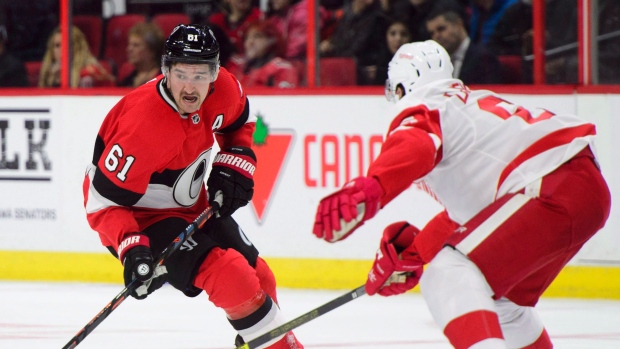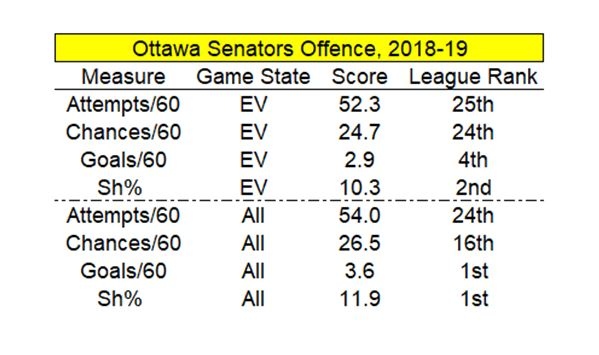Nov 21, 2018
Ottawa home to hockey’s most perplexing team
Electric offensively but abysmal defensively, the Ottawa Senators are one of the NHL’s most fascinating teams this season, Travis Yost writes.
By Travis Yost

The Ottawa Senators aren’t exceeding expectations. With nine wins in 21 games (and playing to an 82-point pace), the rebuilding Senators are right about where we would expect at this point in the season.
But I’m not sure anyone was banking on Ottawa icing one of the league’s most fascinating teams.
Heading into American Thanksgiving, Ottawa has the most perplexing squad in the league. Offensively, the Senators have more than proven that their style of attack is effective. They seemingly send waves of agile attackers who frequently put opposing bluelines in positions of discomfort. Matt Duchene (27 points, fifth in scoring league-wide) has earned most of the attention to date, but Mark Stone (24 points), Thomas Chabot (24 points), Chris Tierney (17 points) and Ryan Dzingel (16 points) are all having impressive offensive seasons.
Ottawa’s attack isn’t a typical gain-the-zone-and-work-the-cycle type of offence. The Senators are much more reliant on aggressive counterattacking and rush sequences to generate scoring chances. Some of this is a result of personnel – the team has clearly tried to transition some of their forward positions to speedier players, especially on the wings. Some of this is also a result of the fact that the Sens just don’t have the puck very much and are frequently bottled up in their defensive third.
At any rate, it’s worked so far. The Senators are relying on converting on a high percentage of their shots, which probably won’t last the full season. But any time you can post a top-five offence for this long you’re probably doing something right. A look at the offensive numbers for Ottawa tabled below:

The numbers are fantastic – certainly more than Pierre Dorion, Guy Boucher or anyone else in the Ottawa organization could have realistically expected from a team in a total rebuild. Even if the shooting percentage regresses over the next 60 or so games, you should have a team that’s at least average or better offensively. That alone is going to be enough to win a number of games this season.
With this kind of scoring you would figure that the Senators would be near the top of the standings, but that obviously isn’t the case. As electric as the Senators have been offensively this season, they’ve been comparatively abysmal defensively – arguably worse, in fact.
If we flip the story to the defensive side of the equation, the table is concerning.

One way to offset a pretty productive attack is to have the worst defence in the league. It’s not particularly close either – Ottawa (be it by shot or scoring-chance measures) lives in the defensive third like no other team and they bleed goals as a result.
The Sens have already conceded 88 goals, putting them on pace for 343 goals against. For a point of reference, the second-worst team from a goals-against standpoint is Vancouver, and they’re on pace to give up 51 fewer goals than the Senators.
The issue is predominantly with volume. If you watch a Senators’ game, the team has a difficult time transitioning the puck out of their own zone and tends to be vulnerable to excessive opponent cycles and multi-shot shifts. Even though some of these shots against come from the perimeter, Ottawa consistently does a poor job of recovering and transitioning out of the defensive third, leaving them susceptible to second-chance and rebound opportunities more often than any other team in the league.
Ottawa giving up about 68 shots per-60 minutes is more than bad. It’s actually the worst number we have seen in over a decade, and that includes a handful of teams that probably weren’t trying to win games – ahem, the 2014-15 Buffalo Sabres – over the full season. Ottawa, fully incentivized to win without a first-round pick, is a different animal entirely.
Here’s how they compare to some of the worst defensive teams in recent history:

Since we already know the Sens are comparatively dreadful when it comes to giving up scoring chances, we can reasonably conclude the team isn’t trading shot quantity for shot quality. What it is doing is leading to some ugly, crooked scores on a fairly routine basis – the Senators already have conceded five or more goals in a single game eight times this season, or 38 per cent of the time.
Their goals-against numbers are comparably concerning. Again, not just in respect to other teams around the league this season, but even in consideration of some of the leakiest teams we have seen in the last decade:

If the Senators hold this pace, they will end up conceding 3,119 shots and 343 goals. If the shots hold, it will be the biggest volume of shots conceded since at least the 1960-61 season. The current high-water mark belongs to the 1992-93 San Jose Sharks, who gave up 3,080 shots. That team, for reference, had an 11-71-2 record in 84 games.
Three hundred and forty-three goals against wouldn’t nearly be as bad within a historical context, but that’s largely because previous eras of hockey – specifically the 1980s – were flush with high-scoring games. That number would sit 58th overall, with the current high-water mark belonging to the expansion 1974-75 Washington Capitals at 446 goals against. The worst goals-against number in the 2000s is property of the 2005-06 Pittsburgh Penguins, who gave up 316 goals in 82 games.
There is little doubt that this type of hockey has drawn some unexpected interest in the Senators this year. The offence is electric and the defence is a disaster – a combination that lends itself to games right out of the Wayne Gretzky era.
Unfortunately for Ottawa though, the offence appears ripe for some degree of regression – they’ll likely remain a strong counterattacking team, but not one that can score on more than 10 per cent of the shots they take at 5-on-5. Defensively, it’s a train wreck, with shots, scoring chances, goals and general goaltending performance all equally woeful.
The Senators had to expect this to some degree. It’s a rebuilding year and their blueline is very raw. With time they will improve. But right now, it’s a mess – one that they’ll need to clean up quickly if they want to stay in any semblance of a playoff race.

